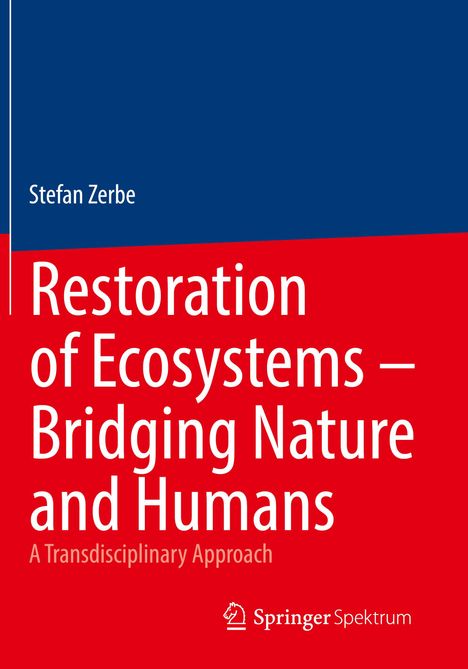Stefan Zerbe: Restoration of Ecosystems - Bridging Nature and Humans, Kartoniert / Broschiert
Restoration of Ecosystems - Bridging Nature and Humans
- A Transdisciplinary Approach
(soweit verfügbar beim Lieferanten)
- Verlag:
- Springer, 02/2024
- Einband:
- Kartoniert / Broschiert, Paperback
- Sprache:
- Englisch
- ISBN-13:
- 9783662656600
- Artikelnummer:
- 11766938
- Umfang:
- 748 Seiten
- Gewicht:
- 1231 g
- Maße:
- 240 x 168 mm
- Stärke:
- 40 mm
- Erscheinungstermin:
- 16.2.2024
- Hinweis
-
Achtung: Artikel ist nicht in deutscher Sprache!
Weitere Ausgaben von Restoration of Ecosystems - Bridging Nature and Humans |
Preis |
|---|
Klappentext
In this interdisciplinary textbook, which bridges the gap between the natural and social sciences both, the scientific principles of restoration ecology and practical aspects of ecosystem restoration are comprehensively presented. The diversity of land-use types with a focus on Central Europe is highlighted and case studies of practical restoration projects are presented. The textbook offers students who deal with the environment as well as scientists and practitioners a profound and up-to-date, but also critical overview of the state of knowledge. This book opens up the broad spectrum of degraded ecosystems of Central European natural and cultural landscapes. In further chapters, marine ecosystems and their restoration as well as development potentials and the limits of restoration are discussed in more detail. The ecological fundamentals are expanded through an interdisciplinary perspective taking into account environmental ethics, sociology, anthropology, and economics. In additionto an up-to-date overview of the various areas and fields of activity in restoration ecology and ecosystem restoration, the textbook provides a valuable basis for studies, science, and practice. The students also receive assistance in searching for literature and critical fact analysis, and the lecturers on teaching formats and interdisciplinary approaches to discussion in restoration ecology.
Biografie
Stefan Zerbe, geb. 1961 in Aschaffenburg, Biologie-Studium in Würzburg und Stuttgart-Hohenheim. Habilitation an der Technischen Universität Berlin. Seit 2001 Gastdozent an der School of Economics der Freien Universität Bozen/Italien. Auslandsaufenthalte in nach Korea und China. 2006 Lehrstuhl für Geobotanik und Landschaftsökologie an der Universität Greifswald. Seit 2007 Leiter des Intern. Master-Programms Landscape Ecology and Nature Conservation. Mitarbeit im Kuratorium der Stiftung Umwelt- und Naturschutz Mecklenburg-Vorpommern. Fachgutachter für verschiedene Förderinstitutionen der Wissenschaft. Forschungsschwerpunkte umfassen die Ebene von der Population über die Lebensgemeinschaften bis hin zu Landschaften mit einem geografischen Schwerpunkt in Mitteleuropa und Zentralasien.

